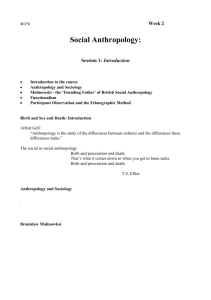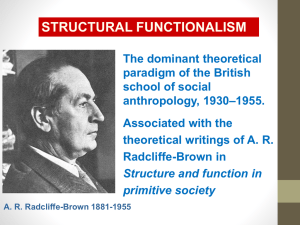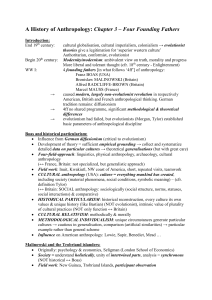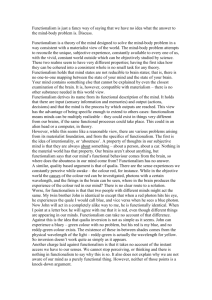Functionalist perspectives in anthropology
advertisement
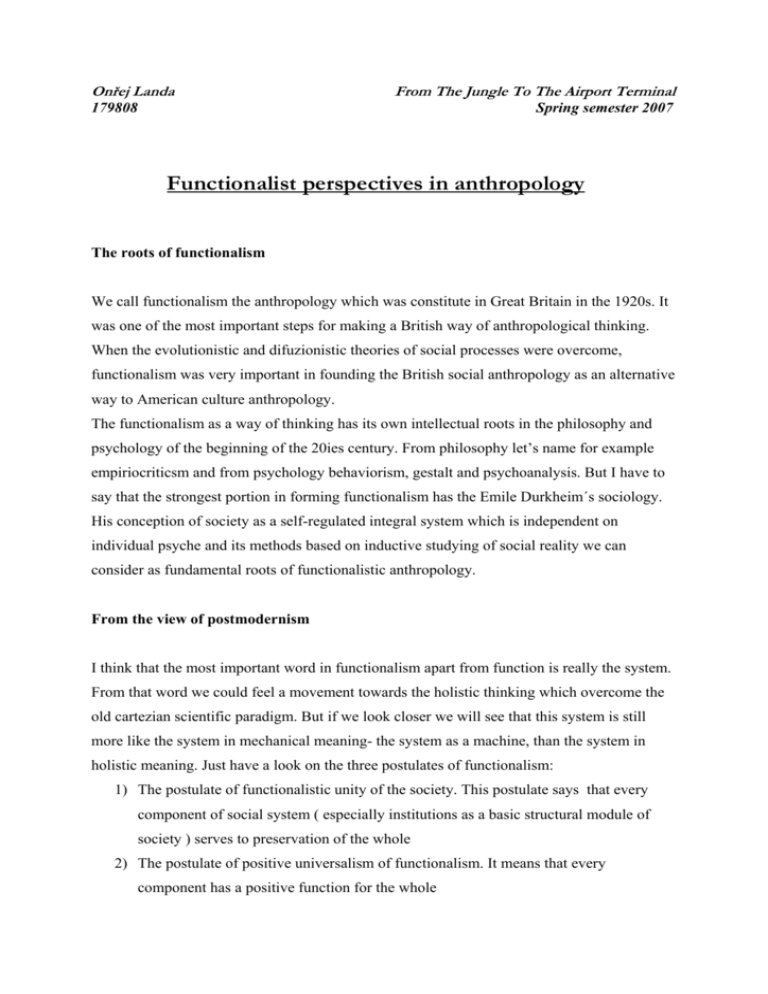
Onřej Landa From The Jungle To The Airport Terminal 179808 Spring semester 2007 Functionalist perspectives in anthropology The roots of functionalism We call functionalism the anthropology which was constitute in Great Britain in the 1920s. It was one of the most important steps for making a British way of anthropological thinking. When the evolutionistic and difuzionistic theories of social processes were overcome, functionalism was very important in founding the British social anthropology as an alternative way to American culture anthropology. The functionalism as a way of thinking has its own intellectual roots in the philosophy and psychology of the beginning of the 20ies century. From philosophy let’s name for example empiriocriticsm and from psychology behaviorism, gestalt and psychoanalysis. But I have to say that the strongest portion in forming functionalism has the Emile Durkheim´s sociology. His conception of society as a self-regulated integral system which is independent on individual psyche and its methods based on inductive studying of social reality we can consider as fundamental roots of functionalistic anthropology. From the view of postmodernism I think that the most important word in functionalism apart from function is really the system. From that word we could feel a movement towards the holistic thinking which overcome the old cartezian scientific paradigm. But if we look closer we will see that this system is still more like the system in mechanical meaning- the system as a machine, than the system in holistic meaning. Just have a look on the three postulates of functionalism: 1) The postulate of functionalistic unity of the society. This postulate says that every component of social system ( especially institutions as a basic structural module of society ) serves to preservation of the whole 2) The postulate of positive universalism of functionalism. It means that every component has a positive function for the whole 3) The postulate of functional importance. Every important life function is unsubstitutable part of the social system and it is not possible to separate it. When we see these postulates, we could say: Well, it is quite holistic, just have look on the emphasis of whole. Yes, the emphasis is there, but for me, to understand the functionalism as a holistic system of thinking, there is incorrect direction of the view on the whole. It is watched from the components. The quality of the components makes the quality of the whole. The postulates actually emphasize the components, parts of the system and not the system itself. And I think that holistic thinking is the exact opposite. The quality of the whole developed the quality of the components and every component is related with all the others. And because I respect the holistic perspective I consider the system in functionalistic meaning as a very narrow idea which is not relevant for explanation of social world. Fieldwork I think the main asset of functionalism is the emphasis on the importance of a fieldwork. The step from libraries to the real world is one of the most distinguish signs which separated (and still does) the anthropologists from other social scientist. Developing of the ethnographic method was actually one of the main factors in creating the functionalistic perspective in anthropology. It is not a coincidence that the founders and leaders of functionalism were great ethnographers Bronislav Kasper Malinowski and Alfred Reginald Radcliffe-Brown. The time of birth of functionalism is holt the year 1922 when the books Adamant’s islanders by Radcliffe-Brown and Argonauts of the western pacific by Malinowski were brought out. I don’t want to write more about the fieldwork and ethnography, because it is a subject for different essay topic, but I am going to look closer on these two main representative of functionalism, and I think that it is necessary to mention that despite quite different opinions about functionalism and anthropology at all these two men had, the emphasis on ethnography was something what connected them. Let’s have a look on these two strong personalities in the history of anthropology. Bronislav Kasper Malinowski It was probably this man who brought the key word function to the anthropology. He even thought himself as a leader of the revolutionary motion in anthropology and there is no doubt that he didn’t mean by this motion anything else than Functionalism. With all the problems that this concept brings. Just for illustration what I mean by this problem, lets have a look on the Radcliffe-Brown statement from the book Structure and function in primitive society: “This Functional School does not really exists: it is a myth invented by Professor Malinowski” (A. R. Radcliffe-Brown, 1961). Malinowski brought a lot of theories relating with society. I am going to mention just one of them – the theory of needs, which is a base of his conceptions of human, society and culture. This theory says that there are three main needs which a man has: 1) The basic (biological) needs which consist of metabolism, reproduction, comfort, safety, relaxation, movement and grow. These needs want to be satisfied, so they cause a culture reaction, they cause another need which is 2) The instrumental need as a kinship system, delivery, hiding place, clothes, protection and so far. 3) The symbolic and integrative need that come from existence of the system of thinking and believes. These needs are satisfied by science, magic, religion, art, games and ceremonies. The satisfaction of these needs is realized by actions that are connected in systems – institutions. Institution is another key word of Malinowski´s anthropology and he was actually the first scientist who brought the topic of studying institutions into the social science. He was interested in institution a lot and brought a lot of thought-provoking ideas about its structure and processes, but I am not going to focus on it. I am more interested in his conceptions of culture. He doesn’t offer one exact definition of culture, as any anthropologist has never done, but he sees it from two different perspectives: 1) As a medium of adaptation where we can easily find the connection with the theory of needs. 2) As an integral and self-regulated system which is based on six integration principles. I assume that in this concept there is more than obvious the relation with Durkheim´s sociology whose lectures Malinowski used to visit in the first ten of 20.century with a great interest. To see the culture as a system is something very typical for British school of anthropology and, in my opinion, Malinowski was the real founder of that way of anthropological thinking. Alfred Reginald Radcliffe-Brown This man represents another branch of functionalism. He is the founder of the way of thinking called the structural functionalism. From that we can easily find out that the base which connects the classical functionalism represented by Malinowski a Radcliffe-Brown´s structural functionalism is still the function and if we talk about the Radclife-Brown functionalistic thinking we can just appeal to the postulates I mentioned above. What makes his perspective special is his emphasis on social structure. Radcliffe-Brown sees the social world and its organization as an analogy to the body and that is the main source of his thoughts about social structure, which he sees as an organization of relationships among people that is controlled by institution. But to be honest, I have nothing to say about his conception of social structure. I have already written about functionalistic system and I see both very similar so I hold any deeper analysis of the Radcliffe-Brown´s social structure as useless. Even the article On social structure haven’t brought anything useful for understanding the specifics of structural functionalism to me. Much more interesting I consider the idea of social value but for writing any relevant about this topic I would need to read the Adamant´s Islanders what I haven’t. Conclusion I think that functionalism is a very important (even essential) step in the evolution of anthropological thinking. It has brought a lot of new impulses for new ideas. It showed a new perspective which was need to try. And it worked in many ways. But, of course, the knowledge of the man is still developing and for that reason, the functionalism is now the past. Very important and integrated past, but still the past. First man who overcame it was E. E. Evans-Pritchard, but that is a different topic… Literature Burton, John W. (1988) Shadows at Twilight: A Note on History and the Ethnographic Present. Proceedings of the American Philosophical Society, 132(4): 420–433. Malinowski, Bronislaw (1939) The Group and the Individual in Functional Analysis. The American Journal of Sociology, 44(6): 938–964. Radcliffe-Brown, A. R. (1965 [1940]) On Social Structure, Chapter 10. In Structure and Function in Primitive Society. New York: Free Press, 188–204. Soukup, Václav (2004), Dějiny antropologie (Encyklopedický přehled dějin fyzické antropologie, paleoantropologie, sociální a kulturní antropologie) , Universita Karlova V Praze, Nakladatelství Karolinum, 425-440
